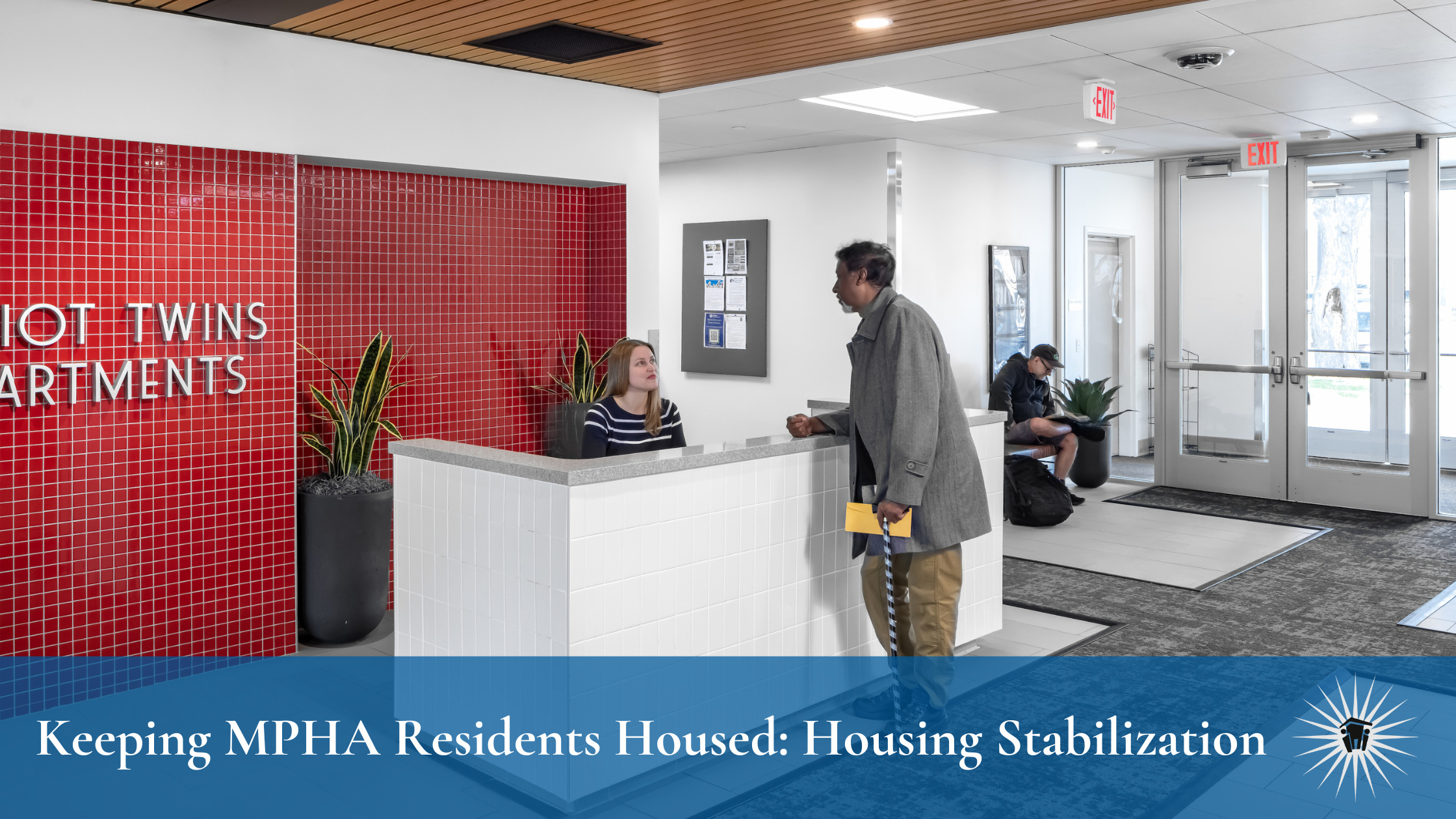The Minneapolis Public Housing Authority (MPHA) provides public and deeply affordable housing to nearly 10,000 residents at 30 percent of the resident’s adjusted income. For the thousands of residents on a fixed income, that means being vulnerable to macroeconomic conditions like inflation for their regular cost of living expenses. While paying $20 more for groceries a week might not seem like a lot to some, for those living in MPHA housing on a fixed income, that change can significantly alter their monthly budget.
Since the pandemic, MPHA has seen a significant increase in the number of residents not making rent payments. Unfortunately, because federal regulations require MPHA to collect rent and prevent the agency from waiving owed balances from current residents, the agency has seen a growing number of residents who had their housing threatened because of changes in their personal expenses.
Seeing this trend emerge early in the pandemic, MPHA established an internal housing stabilization team dedicated to connecting residents that had back-owed rents with various financial and service supports. The team was intended to help residents solve both their immediate financial needs to remain housed and aid in making lasting changes to ensure continued rent payment.
During the pandemic, MPHA assisted nearly 750 MPHA families receive more than $2.5 million in rent relief through RentHelpMN. But while state rental assistance went away, the economic hardships of MPHA residents did not. As a result, the housing stabilization team shifted to Hennepin County’s emergency assistance program. In 2023, the team assisted nearly 450 MPHA families receive more than $800,000 in rent relief payments from Hennepin County’s emergency assistance program.
Leading this work at MPHA is A Vue, Housing Stability Coordinator. A works across MPHA teams and with external partners to ensure residents can remain housed when they face financial challenges.
“Whether it is a single event—like a hospital stay—or a series of unexpected expenses that prevented a resident from paying their rent, having to pay back-rent can be overwhelming,” said A Vue, Housing Stability Coordinator at MPHA. “Our housing stabilization work saves many from eviction.”
When a resident first misses their rent payment, numerous MPHA teams work to connect with the resident. Team members from property management, rent collection, and on-site social services teams work to connect with the residents to understand their unique situation and needs. In some cases, it is as simple as the resident forgetting to pay, but often the missed payment is a result of a changing financial situation.
If a MPHA resident misses a rent payment, staff takes an all-of-the-above approach to help the resident make their payment. On-site property management and social service teams will work to make sure the resident is receiving any social, medical, or wellness benefits they need. The housing stabilization team will connect with the resident to discuss a possible emergency rent assistance application to help clear owed balances.
“We are committed to assisting our residents. Offering support and resources, especially when they aren’t expecting it, brings hope,” said A.
If a resident does not take action to address their owed rent, MPHA’s rent collection team generates a notice cautioning that the resident risks an eviction filing, per federal regulations, if they continue to miss rent payments. These notices usually spur quick action, and the resident either pays the owed balance themselves or one of MPHA’s various interventions help resolve the issue quickly. However, for the residents who continue to miss rent payments and do not attempt to work with staff to identify solutions, MPHA files an eviction action.
An eviction action is a tool of last resort. It requires the resident to appear in court, where they are typically offered an individualized payment plan by MPHA to create an achievable path to repayment and remain housed with the agency in lieu of seeking legal action. The repayment plan is the agency’s final tool available to keep the resident housed. If that repayment plan is unsuccessful, the agency moves ahead with the eviction action.
By its nature, MPHA houses some of the community’s most economically marginalized and under-resourced populations. But because of federal regulations requiring rent collection and prohibiting waiving owed rental balances for current residents, the agency cannot simply allow residents to not pay rents. In fact, rent collections is one of the key financial metrics measured by the U.S. Department of Housing and Urban Development’s (HUD) annual Public Housing Assessment System (PHAS). Further, these results put MPHA’s eviction-related activity in-line with public housing authorities across the country.
As a provider of public and deeply affordable housing to nearly 10,000 residents, it is an integral part of MPHA’s mission to keep residents housed. As such, the agency takes an all-of-the-above approach to help residents having trouble paying their rent—offering support for both immediate financial needs like paying back-owed rent to providing resources that help make lasting changes to prevent rental payment challenges in the future.






